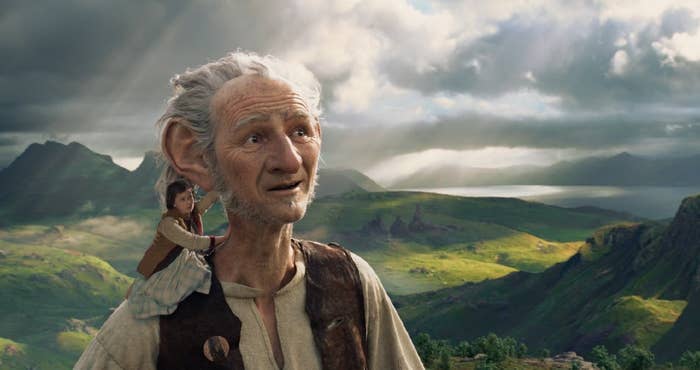
Roald Dahl's novels have sharp edges that tend to get filed away when they're made into movies, seemingly out of a misguided idea that children can't handle a little darkness.
On the pages of James and the Giant Peach, for instance, Aunt Sponge and Aunt Spiker get squashed to death by the titular peach as it rolls down the hill toward the sea; the main character in The Witches is never turned from a mouse back into a boy; and in The BFG, the title character's brethren go out every night and snatch people out of their beds to eat them. But that's largely (heh) abstracted from Steven Spielberg's new adaptation of Dahl's 1982 children's book.
Dahl's BFG isn't just clear about the people-eating, it's filled with irresistibly groanworthy gags about how the natives of various countries taste — Turks are reminiscent of turkey, Swedes have a "Sweden sour taste," and everyone from Greece is safe on account of their greasy flavor. Spielberg's movie vaguely suggests the whole human-hunting thing is a recent development for giants and arranges for the bulk of them to ultimately regret their "cannybull" ways. (Honest question: If a giant's clearly not human, is that accusation fair?)
The Big Friendly Giant of the movie is, as he is in the book, the veggie-munching, malapropism-prone runt of a group of man-gobbling giants. He's played with a twinkle and motion capture technology by Bridge of Spies star Mark Rylance, and he's an overall softer, less odd, easier to take version of the towering character than the unpredictable, shouty one in the book, who feels more like an unstable but kindhearted uncle. He still swivels his big ears, this BFG, but Sophie (Ruby Barnhill), the plucky orphan he snatches when she spots him and whom he quickly befriends, doesn't do any riding in them.

The result is a movie that's comfortable, but also as soporific as a warm, stuffy room. The BFG isn't a book in which all that much happens to begin with, and whittling away some of the weirder and grimmer bits means more time to have to fill with awe. Spielberg whisks some lovely images together to portray the land of the giants, including the den hidden behind a waterfall that the BFG has filled with dreams in bottles like multicolored fireflies, and the way his oversized comrades (played by Bill Hader and Jemaine Clement, among others) use grassy sod as their blankets. But the movie presumes a sense of wonder more often than it actually generates one, from Sophie's trip with the BFG to Dream Country, to the implementation of the pair's plan to enlist the help of the queen (Penelope Wilton, entertainingly proper in the face of a surprising visitor) to get rid of the other giants.
The BFG was written by Melissa Mathison, who died last year, and who wrote the screenplay for Spielberg's E.T. the Extra-Terrestrial, one of the greatest children's movies of all time. In the relationship between Sophie and the BFG, there are echoes of Elliott's friendship with E.T., but there's little of the emotional depth. The movie's got more in common with Spielberg's most recent The Adventures of Tintin, in which the technology also dazzled and the end result also felt a bit hollow.
The BFG creates a cozy '80s England, a sun-dappled giants' otherworld, and a looming, lovable goliath with the expressiveness of a recent Oscar winner, and yet it lacks the soul of Quentin Blake's simple, charmingly squiggly original drawings. Sharp edges may not be safe, but they prevent something from slipping through the fingers the way The BFG does as soon as it's over.

